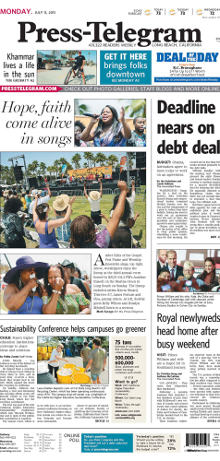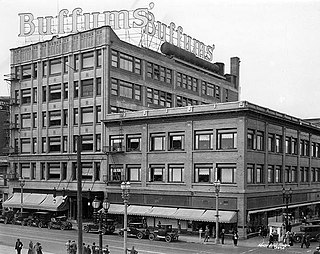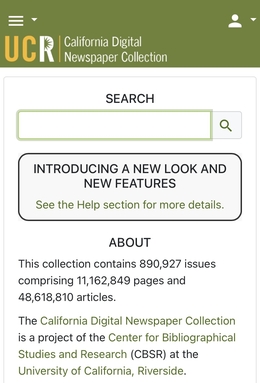

The Emporium was a department store in Downtown Long Beach, California.


The Emporium was a department store in Downtown Long Beach, California.
The Emporium's origins go back to Harry Brown and Stephen L. Powers, whose company S. L. Powers & Co. opened The Great Cash Bargain Store on July 28, 1904, at 32 Pine Street (later 332 Pine) in the then-new W. H. Martin Building. [1]
On March 30, 1905, Powers changed the store name to The Emporium. In January 1907, this first "Emporium" closed. [2]
Meanwhile, Henry D. Meyer of Pasadena who owned Meyer's Department Stores (also written Meyer or Meyers) in Pasadena, Holtville, and Hemet, [3] opened a Long Beach branch at 151 Pine around 1905. [4] In March 1908 T. Sundbye of Huntington Beach partnered with Meyer and the store was known as Meyer & Sundbye's. [5]
Under Meyer's ownership, The Emporium would reopen again on July 31, 1909, this time at 151 Pine, [6] which Meyer had operated as "Meyers Department Store". [7]
On March 29, 1912, The Emporium moved to a new building at the northwest corner of Broadway and Locust. [8]
On May 1, 1914, Henry D. Meyer of Pasadena sold the store to Ed. Ahlswede [9] [10] [11] [12] who had operated a large dry goods store in Chicago, [13] and his son Herbert F. Ahlswede (b. July 5, 1878, Chicago). [14] [15]
In December 1932, The Emporium merged with Marti's department store, which as from December 30 [16] [17] operated at the former Emporium store at Broadway and Locust, now branded Marti's, and closed its old location at 4th and Pine. Marti's held a grand re-opening on January 12, 1933. [18] Marti's in its advertising thanked its customers for their support despite the Great Depression, and in an advertisement profiled its new location: "Marti's New Store will be a Good Store Designed for the Masses without Frills and Fancies…but a Good Store" [19] Nonetheless, Marti's closed for good shortly thereafter.

12P/Pons–Brooks is a periodic comet with an orbital period of 71 years. Comets with an orbital period of 20–200 years are referred to as Halley-type comets. It is one of the brightest known periodic comets, reaching an absolute visual magnitude of about 5 in its approach to perihelion. Comet Pons-Brooks was definitely discovered at Marseilles Observatory in July 1812 by Jean-Louis Pons, and on its next appearance in 1883 by William Robert Brooks. There are ancient records of comets that are suspected of having been apparitions of 12P/Pons–Brooks.
The Southern California News Group (SCNG), formerly the San Gabriel Valley News Group and the Los Angeles News Group, is an umbrella group of local daily newspapers published in the greater Los Angeles area of southern California by Digital First Media, which is owned by the hedge fund Alden Global Capital.

The Press-Telegram is a paid daily newspaper published in Long Beach, California. Coverage area for the Press-Telegram includes Long Beach, Lakewood, Signal Hill, Artesia, Bellflower, Cerritos, Compton, Downey, Hawaiian Gardens, Lynwood, Norwalk and Paramount.
I. Magnin & Company was a San Francisco, California-based high fashion and specialty goods luxury department store. Over the course of its existence, it expanded across the West into Southern California and the adjoining states of Arizona, Oregon, and Washington. In the 1970s, under Federated Department Stores ownership, the chain entered the Chicago, Illinois, and Washington, DC, metropolitan areas. Mary Ann Magnin founded the company in 1876 and named the chain after her husband Isaac.
The Broadway was a mid-level department store chain headquartered in Los Angeles, California. Founded in 1896 by English-born Arthur Letts Sr., and named after what was once the city's main shopping street, the Broadway became a dominant retailer in Southern California and the Southwest. Its fortunes eventually declined, and Federated Department Stores bought the chain in 1995. In 1996, Broadway stores were either closed or converted into Macy's and Bloomingdales.

The Roving Kind was a nationally syndicated American television show distributed by Bill BurrudProductions, which aired on KCOP-TV, Los Angeles, from 1964 to 1968. The series made its debut on September 24, 1965. The show featured producers Milas Hinshaw and Buddy Noonan, who produced, filmed, and narrated the episodes.

Buffums, originally written as Buffums' with an apostrophe, was a chain of upscale department stores, headquartered in Long Beach, California. The Buffums chain began in 1904, when two brothers from Illinois, Charles A. and Edwin E. Buffum, together with other partners, bought the Schilling Bros., the largest dry goods store in Long Beach, and renamed it The Mercantile Co. The store grew to a large downtown department store, and starting in the 1950s, grew slowly over the years to be a small regional chain of 16 speciality department stores across Southern California at the time of its closure in 1990.
Nuts and Wine was a theatrical revue, with lyrics by C. H. Bovill and P. G. Wodehouse and music by Frank E. Tours, with additional numbers by Guy Jones and Melville Gideon, from a book by Bovill and Wodehouse. It was performed at the Empire Theatre, London, opening on 3 January 1914. The show closed on 28 March 1914, after a run of 12 weeks.
Meyer & Holler was an architecture firm based in Los Angeles, California, noted for its opulent commercial buildings and movie theatres, including Grauman's Chinese and Egyptian theatres, built during the 1920s. Meyer & Holler was also known as The Milwaukee Building Company.

The California Digital Newspaper Collection (CDNC) is a freely-available, archive of digitized California newspapers; it is accessible through the project's website. The collection contains over six million pages from over forty-two million articles. The project is part of the Center for Bibliographical Studies and Research (CBSR) at the University of California Riverside.

Desmond's was a Los Angeles–based department store, during its existence second only to Harris & Frank as the oldest Los Angeles retail chain, founded in 1862 as a hat shop by Daniel Desmond near the Los Angeles Plaza. The chain as a whole went out of business in 1981 but Desmond's, Inc. continued as a company that went in to other chains to liquidate them. Desmond's stores in Northridge and West Covina were liquidated only in 1986 and survived in Palm Springs into the first years of the 21st century.

The Fifth Street Store was a major department store in Los Angeles opened in 1905.

Harris & Frank was a clothing retailer and major chain in the history of retail in Southern California, which at its peak had around 40 stores across Southern California and in neighboring states and regions. Its history dates back to a clothing store founded by Leopold Harris in Los Angeles in 1856 near the city's central plaza, only eight years after the city had passed from Mexican to American control. Herman W. Frank joined Harris in partnership 32 years later in 1888.

The Famous Department Store was a department store in Los Angeles, California.

Boadway Bros. or Boadway's was a chain of upscale department stores in Southern California and New Mexico during the 1910s and 1920s, which started with a single store in Pasadena carrying furniture.
The Pacific Electric Railway established streetcar services in Long Beach in 1902. Unlike other cities where Pacific Electric operated local streetcars, Long Beach's system did not predate the company's services. Long Beach's network of streetcars peaked around 1911 with over 30 miles (48 km) of tracks throughout the city. Local services were discontinued in 1940, but interurban service to Los Angeles persisted until 1961. The route of the former main interurban line was rebuilt in the late 1980s as the Metro Blue Line, which operates at-grade with car traffic for a portion of its length.

The Wise Company was a department store in Long Beach, California founded in the early 1900s by W. H. ("Herb") Wise.

Marti's, also known as the Hugh A. Marti Co., was a department store in Long Beach, California, US, opened in February 1923 at 411 Pine Avenue, taking over the Boadway Bros. Long Beach store.
Meyer's Department Store was a department store chain based in Pasadena, California. Over the years Meyer opened stores in Pasadena, Hemet, Holtville, and South Gate. Meyer established a Meyer Department Store in Long Beach at 151 Pine St. c. 1905, then re-opened it in 1909 as The Emporium, selling it in 1914.